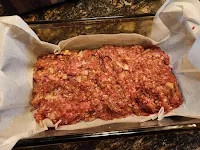The Lions are down 5-1 in the seventh inning. It doesn't look good.
Then Ted gets the call.
Where It All Began
The journey to last night in Stockton began on a different field entirely, decades earlier, with a bucket of tennis balls and a toy wooden bat that looked enormous in four-year-old hands. I bought him his first glove and baseball the day he was born. I know that was more about me than it was about him. But before he was old enough for organized teams, we were out in the backyard, me pitching underhand, him swinging with all the ferocity a preschooler could muster.That little boy who slept with his glove under his pillow became the kid who mimicked batting stances he saw on TV, who lived and breathed Cubs baseball like his dad. He had a quick bat and a sharp eye, even as a little kid. He didn't just play baseball; he loved it. He studied it. From the time he started in Tee Ball, I saw his competitive fire up close. He wanted to win, sure, but more than that, he wanted to be better. To do it right. To work harder. To be ready.
His first Little League hit was an RBI triple off Nate Rousey. I still remember that poor Nate cried afterward. His first home run came the next season. With each passing year, the instincts sharpened. The arm got stronger. The glove got quieter. The bat got louder. By the time he was a senior in high school at Crescenta Valley, he wasn't just a good player; he was a leader, a shortstop you built your infield around, a pitcher you trusted in big moments.And then came that magical evening against Arcadia High four years ago. Two outs in the bottom of the seventh, the Pacific League title hanging in the balance. CV down 4-2. Ted stepped up to the plate and launched a three-run homer into the night to give us a 5-4 victory and the championship.
Crack. That sound, you know the one. The sound that makes a stadium rise as one. The ball sailing high over the left-center-field fence. But this wasn't some major league park. This was a high school diamond where my son had just become a legend, where years of backyard practice and Little League dreams crystallized into one perfect swing.The College Years: Learning to Let Go
When Ted committed to LMU, it felt like the natural next chapter. Division I baseball was his dream realized. But it also marked a profound transition for me: from the sidelines coach who knew every pitch and every at-bat to the distant observer, I was lucky that he was close by, so I could watch home games, and I went to as many away games as time and schedule permitted. I followed LMU's box scores online, and loved the chance to take him to dinner after games.
But college baseball is different. The talent gap narrows. The stakes feel higher. And parents have to step back, to trust the coaches, to let their kids figure it out on their own. The intense involvement of Little League and high school gives way to something more like faith. Faith that all those years of instruction, all those conversations about effort and attitude and what it means to be a teammate, have taken root.
For four years, I've watched from afar as Ted found his place on the team, from third base his freshman and sophomore years, and an injury that sidelined his junior year, then as a pitcher in his senior year. I watched while he learned what it meant to compete at the highest amateur level. There have been highs and lows, moments of brilliance and stretches of struggle. The typical arc of a college athlete learning that talent alone isn't enough, that consistency, mental toughness, and team-first thinking separate the good from the great.
Last Night
Which brings us to last night in Stockton, to that elimination game, to Ted jogging in from the bullpen with the season on the line.
Down 5-1 in the seventh, facing a BYU rally with runners on base, this was exactly the kind of pressure moment we'd talked about since he was little. Not the glory moments, not the home runs or the strikeouts that make highlight reels, but the quiet, crucial situations where everything you've learned gets distilled into execution.
He shuts down the scoring threat in the bottom of the seventh. It wasn't perfect, but it was good.
Then, he pitches an almost spotless eighth inning.
Watching from six hundred miles away on that grainy stream, I can feel something building. The Lions start scratching and clawing in the ninth, mounting a comeback that brings them to within one run. Tying run at third base, two outs... For a moment, I can see it all unfolding: the impossible rally, the championship game I'll drive to today, one more chance to see him pitch at this level.
But baseball doesn't always deliver the endings we script in our heads. The Lions fell short, 5-4. The comeback comes up just shy. Ted's college career ends not with a championship, but with 1⅔ innings of relief, one strikeout, no runs allowed, and a team given every chance to win.
It was a beautiful ending, even in defeat.
What I'm Realizing This Morning
I had hoped to see Ted play live one more time. To make that drive to Stockton again, for the third time in four years, for today's championship game, to sit in the familiar bleachers and watch my son take the mound in the biggest game of his college career. That's not in the cards.
But as I watched him walk off that field last night for the final time, something unexpected happened. Instead of disappointment, I felt overwhelming gratitude. Not sadness that it's over, but appreciation for what we've shared.
I don't need one more game. I have a lifetime of them.
I have those early backyard sessions with tennis balls and patient instruction. I have Little League memories of a gradual transformation from enthusiastic kid to serious ballplayer. I've coached him, watched him grow, seen him develop not just as a player but as a young man who understands what it means to be part of something bigger than himself.He has high school glory, that championship-clinching homer that still gives me chills, the no-hitter against Loyola High earlier that spring, and the Pacific League MVP award. The moments when talent met opportunity and created magic.
And now I have this: watching him finish his competitive career with grace, professionalism, and the kind of performance that reminds me why I fell in love with this game in the first place. Two crucial innings when his team needed him most. No fanfare, no headlines, just a job well done when it mattered.
The Gift of the Last Game
The thing about being a baseball parent is that you spend so many years living for the next game, the next season, the next level. You mark time by tournament weekends and playoff runs. Your calendar revolves around practice schedules and game times. And then, suddenly, it's over.
What I'm learning this morning is that sometimes the endings we don't choose are more meaningful than the ones we plan. I thought I wanted one perfect final game, one last chance to see him pitch with everything on the line. Instead, I'm getting something better: the realization that Ted has become exactly what we hoped when he first picked up that toy wooden bat.
A player who can be counted on. One who can handle pressure. One who will leave everything on the field, whether the lights are bright or dim, whether the crowd is thousands or just a few parents and coaches watching a live stream. Someone who understands that how you finish matters as much as how you start.
Ted's baseball career has taught him about effort, teamwork, resilience, and what it means to be reliable when others are counting on you. It's taught me about patience, pride, letting go, and the beautiful complexity of watching your child pursue their dreams at the highest level they can reach.
What Remains
Now he's moving on to a career, to a life beyond the diamond. But somewhere in him will always be that four-year-old swinging the big wooden bat, that Little Leaguer crossing home plate after his first homer, that high schooler rounding the bases in triumph, that college pitcher walking off the mound after giving his team every chance to win.
And somewhere in me will always be the dad who got to watch it all unfold, one game at a time, one memory at a time, grateful for every single pitch.
Even the last one.
Especially the last one.
Because that's when I learned that the end of something beautiful isn't always sad. Sometimes it's just complete.
I'm grateful, too, that I was able to capture last night's game. That live stream, which I managed to grab, now holds Ted's final collegiate performance. Having it preserved means our family can revisit this moment, not just the statistics or the outcome, but the grace under pressure, the professionalism, the way he carried himself in those crucial innings. Years from now, when the details start to fade, we'll be able to watch again and remember not just what happened, but how it felt to witness the beautiful completion of a chapter we'd been writing together for over two decades.
Sometimes the most precious gifts come in the form of technology we take for granted until it captures something irreplaceable.






